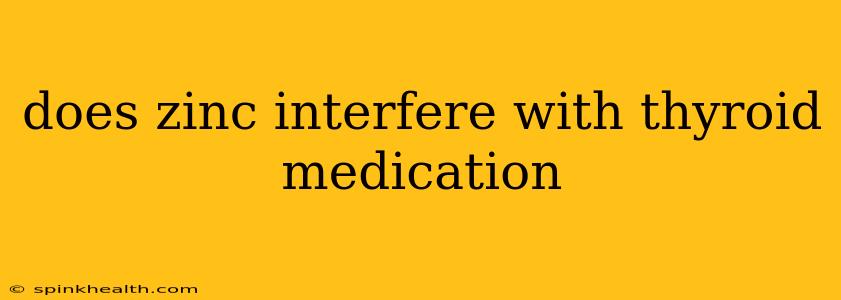Does Zinc Interfere with Thyroid Medication? Unraveling the Complex Relationship
The question of whether zinc interferes with thyroid medication is a complex one, not easily answered with a simple "yes" or "no." It's a story that unfolds through scientific understanding, individual responses, and the delicate balance within our bodies. Let's delve into the details to unravel this mystery.
Many people take zinc supplements for various health reasons, from boosting immunity to supporting wound healing. Meanwhile, millions rely on thyroid medication, like levothyroxine (Synthroid), to manage hypothyroidism. The potential interaction lies in how these substances are absorbed and processed within the body.
How Thyroid Medication Works
Thyroid hormone replacement therapy, primarily using levothyroxine, aims to restore the levels of thyroid hormones (T3 and T4) needed for proper bodily functions. These hormones are crucial for metabolism, energy production, and numerous other processes. The medication needs to be absorbed effectively into the bloodstream to work its magic.
Zinc's Role and Potential Interaction
Zinc is an essential mineral involved in hundreds of enzymatic processes within the body. The key to understanding its potential interaction with thyroid medication lies in its impact on mineral absorption. While zinc itself isn't directly known to inhibit the absorption of levothyroxine, it can influence the absorption of other minerals, potentially indirectly affecting thyroid medication.
Can Zinc Supplements Affect Thyroid Medication Absorption?
This is where things get interesting. Some studies suggest that high doses of zinc might reduce the absorption of certain minerals, including iron. While not directly impacting levothyroxine, this indirect effect could theoretically impact iron levels which are involved in thyroid hormone production. Therefore, any significant mineral imbalance caused by zinc supplementation could, in theory, indirectly influence thyroid function. However, it's important to note that this is not consistently demonstrated. Many individuals take both zinc supplements and thyroid medication without experiencing problems.
What about other forms of zinc?
The form of zinc matters. Zinc picolinate, for example, is often better absorbed than other forms. This means there's a higher chance that high doses could potentially lead to interactions, though research on this specific interaction with thyroid medication remains limited.
What are the symptoms of a possible interaction?
It's tricky to pinpoint symptoms specifically due to a zinc-thyroid medication interaction. Symptoms of undertreated hypothyroidism (hypothyroidism itself or due to medication interference) are often non-specific and can include fatigue, weight gain, constipation, cold intolerance, and dry skin. It's crucial to note these symptoms can also be caused by other factors. If you're experiencing any changes in your symptoms or thyroid levels, consult your doctor.
What should I do if I take both zinc and thyroid medication?
The most important advice is communication with your doctor or endocrinologist. They can assess your individual needs, monitor your thyroid levels, and advise on the appropriate dosage of both zinc and thyroid medication. Timing of taking your medication also matters. Separating the administration of zinc supplements and thyroid medication by several hours can help minimize any potential interactions.
Disclaimer: This information is intended for educational purposes only and should not be considered medical advice. Always consult with your healthcare provider before starting or altering any medication or supplement regimen. They can assess your individual needs and provide personalized guidance.

